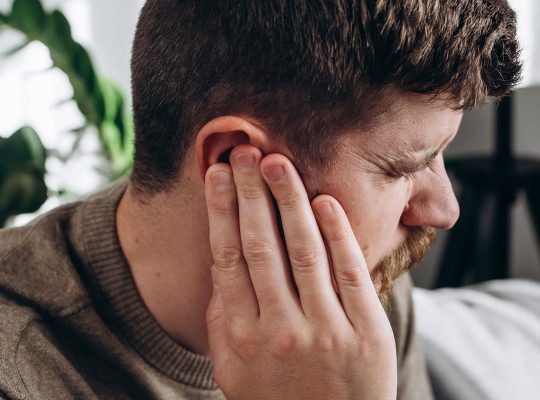A sudden ringing in your ear – it happens to more people than you think. You’re sitting quietly on the couch, lying in bed or just coming home from a party, and suddenly you hear that persistent, high-pitched sound. Nothing can be heard in the room, but your ear thinks otherwise. That irritating beep is called tinnitus, and while it often goes away on its own, it can also linger. In this blog, you’ll learn what tinnitus is, where it comes from, when to worry about it, and most importantly, what you can do about it.
What is tinnitus anyway?
Tinnitus is not a disease but a phenomenon. It literally means hearing sound without an external source. It can be a squeak, but also a hum, hiss or whistling sound. Some people hear it in one ear, others in both. It can be constant or come and go in waves.
For some it is hardly noticeable, for others it is hugely disturbing. Especially when it is quiet around you – at night, for example – the sound seems much stronger. That makes sense: your brain has no distractions, so the beep gets all the attention.
Where is that squeak coming from?
The best-known cause of tinnitus is exposure to loud noise. After an evening of steps or a festival, you often hear that typical, high-pitched squeak. It usually goes away within a day, but sometimes it lingers. Yet that’s not the only cause. Several things can come into play:
- Noise damage: loud music, machines or headphones at full volume can damage the cilia in the inner ear.
- Earwax plug: when earwax builds up, it can put pressure on the eardrum and cause temporary tinnitus.
- Inflammation or fluid: With a middle ear infection or fluid behind the eardrum, you sometimes hear a hum or hiss.
- Stress or high blood pressure: tension and physical stress affect blood flow in your head and ears, which can worsen tinnitus.
- Medication: certain medications (such as aspirin or some antibiotics) can have an adverse effect on hearing.
- Hearing loss: when the brain receives fewer sound signals, it begins to “replenish” sound itself. This is called compensatory tinnitus.
So sometimes it’s a temporary problem, sometimes a signal that something is structurally wrong in your hearing.
Is tinnitus dangerous?
In most cases, tinnitus is not dangerous, but it is a warning sign. Your ears have probably been through too much, or something is affecting your hearing.
Does the squeak not disappear within 24 to 48 hours? Or does it keep coming back? Then it is wise to visit your doctor or
What can you do if you have tinnitus?
Tinnitus is not always curable, but there are ways to reduce it or deal with it better.
1. Give your ears a rest
Have you just heard loud music, or are you often in noisy environments? Then it’s important to give your ears a break. Don’t put on headphones and avoid loud noises for a few days.
2. Protect your hearing
Preventing the squeak from getting worse is crucial. Wear earplugs at festivals, concerts or while working with machinery. There are also special music plugs that dampen the volume without distorting the sound.
3. Avoid silence
Silence often makes tinnitus more audible. Therefore, turn on some background noise, such as soft music, nature sounds or white noise. On Spotify, for example, you can find tinnitus masking playlists that help hide the beep behind a constant sound, like ours! Some people benefit from ASMR or ambient music with specific frequencies, such as 528 Hz.
4. Relax
Stress and tension are known triggers for tinnitus. Try relaxation exercises, yoga, breathing training or just a quiet walk. Your brain reacts strongly to stress – and a relaxed brain often hears the beep less intensely.
5. Stay healthy
Eat a variety of foods, exercise regularly and limit caffeine, nicotine and alcohol. These substances can affect the blood flow in your ears. Getting enough sleep is also important: in fact, your hearing recovers best when you do, too.
6. Talk about it
Tinnitus can be mentally tough, especially if it persists. Talking to an audiologist, family doctor or peers can help. There are special tinnitus therapies that teach how to cope with the sound, such as Tinnitus Retraining Therapy (TRT) or cognitive behavioral therapy.
Sleeping with tinnitus
At night, when everything around you is quiet, the squeak often seems louder. Fortunately, there are ways to get through the night:
- Turn on a soft music or white noise.
- Use a sleep ear pillow with speaker so only you can hear it.
- Avoid screens and bright lights before bedtime.
- Maintain a regular sleep rhythm.
Some people find that their tinnitus softens after relaxation or a hot shower – small things can sometimes make a big difference.
Does tinnitus go away on its own?
Fortunately, it does: in many cases, the squeak disappears on its own within a few days to weeks. Especially if the cause was one-time overuse.
Does it last longer (more than three weeks)? Then we speak of chronic tinnitus. This does not necessarily mean that you suffer from it permanently, but it does mean that your ears deserve some extra attention. An audiologist or ENT doctor can help investigate what exactly is going on.
Technology and tinnitus
Technology does not stand still. Modern
In addition, wearables, such as smartwatches, can provide insight into stress, sleep and heart rate. By improving those factors, you often notice a slight decrease in tinnitus as well.
When should you see your audiologist or doctor?
A squeak in your ear may be harmless, but take it seriously if:
- the squeak occurred suddenly;
- you also hear worse on one side;
- you feel dizzy or pressure in your ear;
- the noise has not diminished after a week.
In that case, the audiologist can perform a hearing test do. The family doctor may be able to refer you to the ENT doctor for further examination.
Can you prevent tinnitus?
Prevention is better than cure. Your ears are fragile – so treat them with care:
- Wear earplugs at concerts, festivals and loud environments.
- Never set your headphones louder than 60% of maximum volume.
- Take frequent sound breaks, especially if you are listening for a long time.
- Have your hearing tested at an audiologist once a year.
A simple habit like hearing protection can make a lifelong difference.
In conclusion
A beep in your ear can be scary for a while, but it’s usually temporary. Think of it as a warning light: your ears need rest. Give them that rest, protect them well and keep the volume a little lower.
Does the wheeze persist anyway? Then fortunately, there are plenty of ways to learn to cope – from relaxation to technology to therapy.
Your hearing is valuable. You use it every moment of every day, often without thinking about it. Until it squeaks for a moment. Maybe that’s exactly the time to give your ears some extra attention.
Want to know more about tinnitus, hearing protection or aids that can help? Then take a look in our webshop or contact us – we’d love to help you enjoy silence again.








